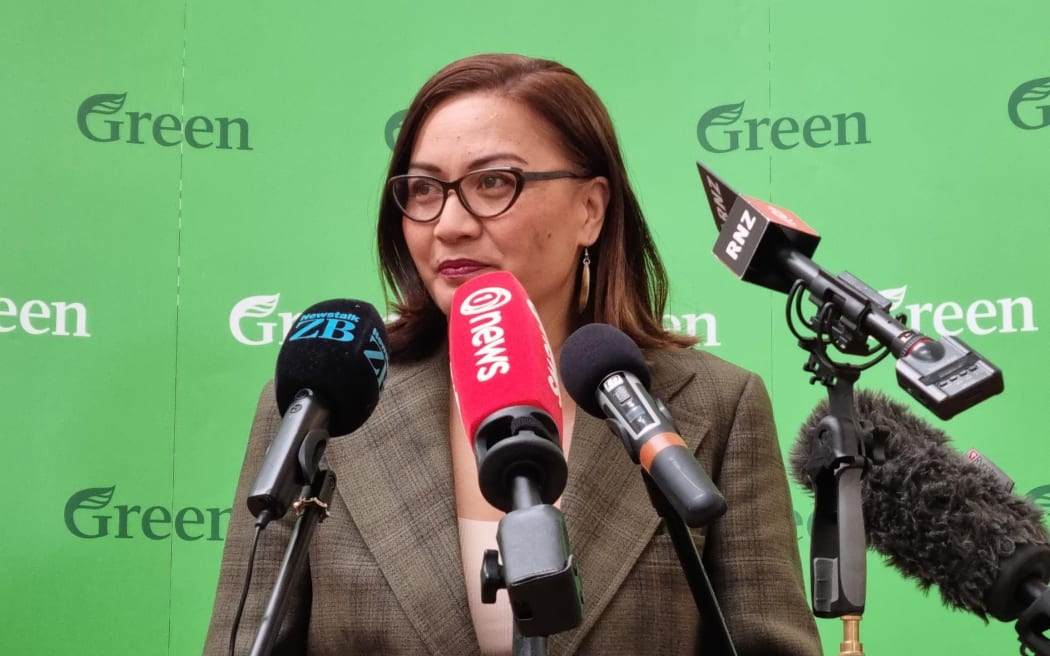Green Party co-leader Marama Davidson talks to Mihingarangi about her role as Minister for the Prevention of Family and Sexual Violence. In an extended interview, she discusses the Green's relationship with Labour, tax, Hoki Whenua Mai, climate change, and the Kermadecs.
Green Party co-leader Marama Davidson says a wealth tax bringing in $12 billion a year would provide the funds needed to reduce poverty in Aotearoa.
The Green's tax policy includes the 'income guarantee'. This promises every New Zealander their income after tax will never fall below $385 for a single person, $779 for a couple and $735 for a single parent.

Te Māngai Pāho Photo: Te Māngai Pāho

Photo: supplied
"It will be paid for with a wealth tax that in total brings in about $12b in the first year. That will more than cover our income guarantee, our dental policies, our oceans policy, our hoki whenua mai, all of the policies that we are proposing," Davidson said.
"The Greens are clear we have to step up to the size of the challenges, and ending poverty - especially whānau and tamariki poverty - will go a long way to the Aotearoa that everybody deserves."
Māori land
A key Green policy, hoki whenua mai, would address the taking of Māori land and abolish the 2008 deadline for lodging new Treaty of Waitangi claims.
A $350m fund would be established to buy back stolen lands.
The policy would reinstate the ability for the Waitangi Tribunal to make recommendations about privately held land.
"When private land becomes available, iwi and hapū haven't had any way to hold onto that and that's what we would like to see the starting-off $350m fund being used for.
"Also, ending perpetual leases. Ending those 999 or even 99-year leases, where Māori have had no benefits and no control and no say and no ability to get their control back.
"Ending the ability for the Public Works Act to ... confiscate even more Māori land. All of those things are in our hoki whenua mai policy."
She said Māori did not want to "run whānau off their land with guns, which is what happened to Māori", but to begin discussions about the best way for Māori land to be released from historical leases and returned.
"Fair compensation" could be paid from the government's Treaty settlement funds to individuals or organisations whose leases were ended, she said.
The Greens want to establish a commission of inquiry into the extent of land dispossession and the adequacy of redress,
"Treaties aren't settled. It's about enduring relationships. It's not something to just 'quickly get those Māoris off our backs'," Davidson said.
"Less than two percent is the majority of where settlements have fallen. And actually increasing what is returned would be of benefit to all New Zealanders, not just Maori."

Green Party co-leader Marama Davidson. Photo: RNZ / Niva Chittock
She described ACT's Treaty policies as "unhelpful and quite harmful to democracy".
"The fear, the ignorance and the racism is being whipped up by political leaders and... that is unconscionable."
Davidson said headline-grabbing shock tactics were purposely used by some politicians to put voters - particularly young, progressive voters - off engaging with politics.
"I'm urging people to resist that, to maintain their mana and their vote."
Climate change
More action on climate change is a key aspect of Green Party policy. They want a circular economy, with individuals and producers taking more responsibility for their waste.
"Transport and agriculture are the two sectors... with the biggest emissions and we absolutely want to put a proper price on methane emissons, on agricultural emissions, to bring those emissions down.
"But also, more pūtea and support for farmers to change the way they use land, water and emit methane."
Violence
As Minister for Prevention of Family and Sexual Violence, Davidson has been working towards reducing violence in New Zealand, which predominantly affects Māori women aged between 20 and 29. She hopes to continue that work in Parliament, but said it needed to continue no matter what, with more money needed for violence prevention services.
"Right now, we can choose to take the next generation or two to address the dirvers of violence - and they are complex - or we can face up to another 200 years of intergenerational violence," Davidson said.
Free dental care for all, a rent cap and protecting 30 percent of New Zealand seas were other important Green policies, she said.

